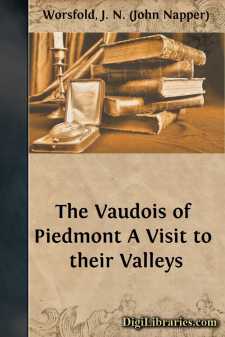Categories
- Antiques & Collectibles 13
- Architecture 36
- Art 48
- Bibles 22
- Biography & Autobiography 813
- Body, Mind & Spirit 142
- Business & Economics 28
- Children's Books 17
- Children's Fiction 14
- Computers 4
- Cooking 94
- Crafts & Hobbies 4
- Drama 346
- Education 46
- Family & Relationships 57
- Fiction 11829
- Games 19
- Gardening 17
- Health & Fitness 34
- History 1377
- House & Home 1
- Humor 147
- Juvenile Fiction 1873
- Juvenile Nonfiction 202
- Language Arts & Disciplines 88
- Law 16
- Literary Collections 686
- Literary Criticism 179
- Mathematics 13
- Medical 41
- Music 40
- Nature 179
- Non-Classifiable 1768
- Performing Arts 7
- Periodicals 1453
- Philosophy 64
- Photography 2
- Poetry 896
- Political Science 203
- Psychology 42
- Reference 154
- Religion 513
- Science 126
- Self-Help 84
- Social Science 81
- Sports & Recreation 34
- Study Aids 3
- Technology & Engineering 59
- Transportation 23
- Travel 463
- True Crime 29
The Vaudois of Piedmont A Visit to their Valleys
Categories:
Description:
Excerpt
CHAPTER I.
Early on the morning of Easter Monday, 1871, in company with a devoted Italian pastor, I left my temporary home in the comfortable "Grand Hotel," in the little town of Pallanza, to gratify a long-felt desire of visiting that part of Europe made sacred by ages of heroic suffering and courageous endurance for faith and fatherland—the valleys of Piedmont. As we steamed up the lake Maggiore the thin mist of early morn cleared off, and by the time we had passed the far-famed Borromean Islands the eye was ravished with the scenes of beauty on every side. Trees and flowers bloomed forth in the lovely vesture of an Italian spring, and the hills, villas, and gardens on the shores of the lake were imaged forth as in a mirror on its own fair bosom.
In this reverie of delight our boat landed us at Arona, where we disembarked and entered the train for Turin. We reached the latter city in about three hours, and after a short delay at the refreshment-room, called upon the Vaudois pastor, the Rev. J. P. Meille, who received us most kindly, and showed us over the stately temple belonging to his church, situated in one of the best streets (the Corso del Re), and which, by its imposing character, as compared with the general simplicity of the Vaudois ecclesiastical buildings, fitly illustrates their altered circumstances as a Church and a community—no longer persecuted, plundered, proscribed, and down-trodden!
The erection of this building was indeed the first public and palpable evidence that the era of political and religious liberty for the Waldenses, inaugurated by the edict of emancipation, dated February 17th, 1848, was really to be enjoyed by them. Its foundations were laid on the 29th October, 1851, by a solemn ceremonial. Delegates from the table of the Vaudois Church, the consistory of Turin, and all the representatives of Protestant states, together with a numerous concourse of sympathizers and lookers-on, were present. This great innovation upon the long reign of intolerance was not accomplished without considerable effort. In the first place, it was necessary to obtain the authorization of the government, and this was the more difficult from the circumstance that liberty of conscience and public worship were not formally inscribed on the "Statuto," so that the government might have refused the authorization, and yet not have violated the strict letter of the law. Happily, however, the president of the council of ministers at that time was the Count Cavour, whose influence procured the necessary permission. Many attempts, however, were made to undo this concession, and even when the royal sanction had been obtained these efforts were so numerous and influential that nothing but the proverbial justice of the sovereign, and the constancy of his minister, availed to secure success. The last piece of opposition to the desire of the Vaudois and their friends was made by a man whose name remained as the living incarnation of the former régime, the Count Solaro Margherita, who, during the long years under the reign of Charles Albert, had held the helm of the state, and was completely in bondage to the Jesuits. Though infirm in body, he betook himself to the presence of the successor of his ancient master, and falling on his knees, said to him, "Sire, do not refuse one of the most faithful servants of your dynasty the last favour that he will ask of you before he quits this earth, viz., that you do not allow the good and loyal city of Turin to have the grief and shame of seeing erected within its walls an edifice set apart for the preaching of heresy." (See Meille's Life of Gen. Beckwith.) The king referred the suppliant to his ministers, who never dreamt of recalling their decision, and the good work proceeded. So that within a little over two years from its commencement the dedication of the temple took place, on the 15th of December, 1853. There was a great gathering of all ranks of society, including the greater portion of the diplomatique body resident in Turin, the senators, the deputies, a delegation from the national guard of the city with their officers at their head....


